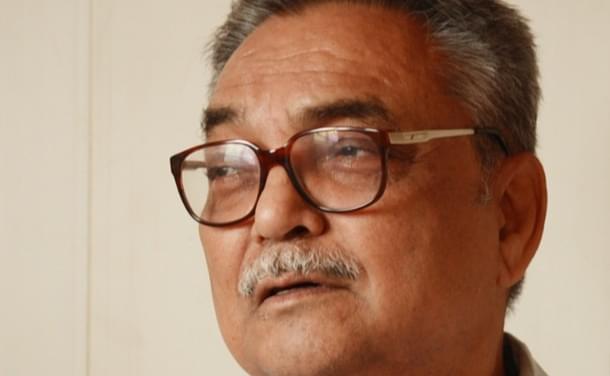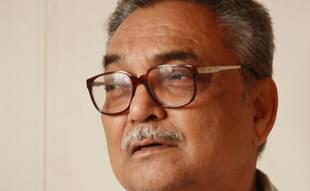Economy
Remembering Sharad Joshi, The Jeans-Clad Farmer
Ajit Ranade
Jun 17, 2017, 12:42 PM | Updated 12:42 PM IST
Save & read from anywhere!
Bookmark stories for easy access on any device or the Swarajya app.


He was among the first to coin the phrase “India versus Bharat”. This evocative term captured the widening gulf between urban and rural, between agriculture and industry, between sectors blessed by liberalisation and not. But most of all, it captured what was most correlated to the widening rich-poor divide.
We now know that much of India’s poverty is in the rural areas, confined mostly within agriculture. At the present time, when there is an epidemic of farm loan waivers, when millions of farmers are agitating, some even violently, for better prices, it is worth recalling the sharp insight of that radical thinker, activist and farmer, Sharad Joshi. He was born in 1935 into a family with no connection to farming. A commerce graduate from Sydenham College of Commerce and Economics, Mumbai, he served in the Indian Postal Service, and later did an eight-year stint with the United Nations in Switzerland. He could have retired with a comfortable pension. But his restless desire to participate in public life, to join the battle against India’s poverty, and his dissatisfaction with institutional shallowness in understanding the problems of farmers, brought him back to India.
He chucked his job, and invested most of his savings into a 27-acre farm plot near Pune in 1977. He wanted to learn first-hand about rain-fed farming, his approach was scientific, and he kept meticulous accounts. He discovered that despite so-called state support, farming was just not remunerative. For Rs 100 of income, the farmer’s total cost, including his own labour, was around Rs 180. There was thus a net negative subsidy. This was later confirmed by detailed analysis and calculation of the aggregate measure of support (AMS), used in the negotiations leading up to the formation of the World Trade Organization. Unlike the developed countries, India’s farmer was being net penalised, despite the illusion of state support.
India’s industry-led development model since independence aimed to keep wage goods cheap (i.e., food prices low) to benefit industry. This meant lower remuneration to farmers by design. To offset this handicap of low output prices, we had an elaborate mechanism to keep input prices low, a classic Soviet-style planning mindset (see Mint column “Removing Anti-farm Bias”, 20 September 2016). Hence inputs were subsidised. These were fertiliser, electricity, credit and water. To this day we are struggling to get out of that subsidy maze. Since there are no quantity constraints, nor is the subsidy linked to poverty, it gets cornered by larger farmers. Even the minimum support price system tends to benefit those with a larger marketable surplus. But Joshi’s insight was deeper, and he wasn’t just thinking of tinkering with cost and price formulae. He realised that it was not enough to demand higher output prices. The whole statist system had to be dismantled. This meant removing the shackles of the Essential Commodities Act, doing away with compulsory procurement, allowing tenancy farming, improving credit flow, legitimising moneylenders with proper regulation, enabling direct contact of buyers and sellers, including contract farming, removing export controls and allowing derivatives and speculation. He was one of the first to advocate liberalisation of the agriculture sector – a task that has still hardly begun.
Joshi also advocated capitalist-style joint stock companies owned by farmers to do value-added agroprocessing, and owning a substantial part of the farm-to-fork value chain. He advocated a seamless unconstrained nationwide agricultural market. Some of his ideas from the 1980s are seeing the light of day, but it’s only a glimmer. He wasn’t simply a thinker who could articulate but also someone who was able to mobilise millions of farmers, transcending lines of caste, language and religion. Joshi set up the Shetkari Sanghatana in 1979 to demand higher output prices and for access to markets and technology. The 1980 agitation against crashing onion prices saw more than a million farmers take to the state highways of Maharashtra.
He was an articulate leader who could break complex concepts into simple statements, and who provided the intellectual horsepower to the farmers’ movement. The Sanghatana said, “Bheek nako, ghamache daam hawe (we don’t want alms, we want the price of our sweat and toil)”. In an indirect way, it was advocacy for the removal of state controls, and for introducing market principles and fair pricing.
Critics of Joshi, used to leftist state-led solutions, found his liberalism too much to accept. Other critics accused him of being blind to the caste and social oppression in village life. But Joshi was convinced of the need for bringing in genuine liberalisation to Indian agriculture, a strand of thought that goes back to the founders of the Swatantra Party of C Rajagopalachari. Joshi’s attempt at entering political life was unsuccessful, and led to his Sanghatana splintering into several factions. His close aides were dismayed by some of the political compromises that he made to secure a seat in the Rajya Sabha. But he maintained that it was a tactical ploy to be able to raise farm-related issues in Parliament.
He died mostly out of the public eye in December 2015. But his advocacy is as relevant today as it was then. A new thoroughly researched biography of Joshi, written by Bhanu Kale, is a must-read for those who want to bring Joshi’s ideas into practice. Despite rising rural wages, continuously rising minimum support prices, a record flow of bank credit and a bounty of agriculture production, if we still have farmer suicides and farm distress, manifest in the current agitation, it means we are falling short of genuine and sustainable solutions. Many can be found in the holistic approach passionately advocated by that jeans-clad farmer.
(Featured photo credit: Gunwant Patil, President of Shetkari Sanghatana, Maharashtra state unit)
This article was originally published in Mint and has been republished here with permission.
Ajit Ranade is chief economist at Aditya Birla Group.





